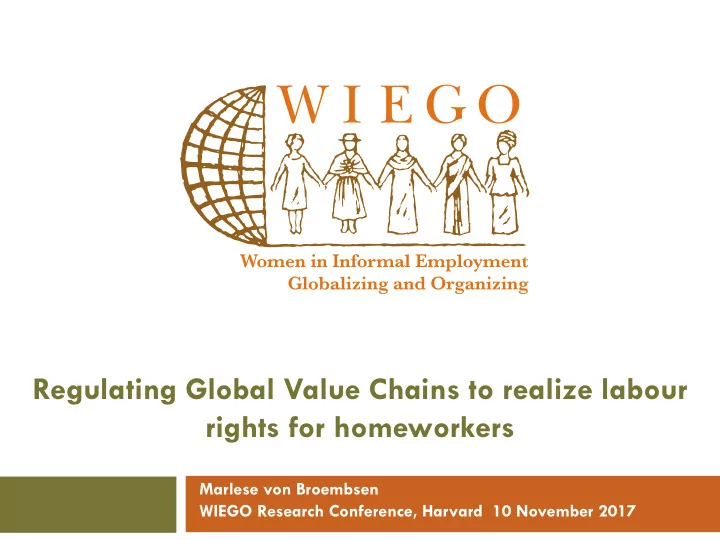

Regulating Global Value Chains to realize labour rights for homeworkers Marlese von Broembsen WIEGO Research Conference, Harvard 10 November 2017
Vertical disintegration of production – global value chains ¨ Technological innovation, lower transport costs, exchange control de-regulation, WTO law (esp the General Agreement on Trade Tariffs); low wages in developing countries; and neo-liberal ideology propagating “labour flexibility” ¨ Labour flexibility (Standing 1999): ¤ “ production or organizational flexibility (outsourcing) ¤ “ wage system flexibility” ( the wage-costs of production) ¤ “ labour cost flexibility” ( non-wage component of labour) ¤ “numerical flexibility ”(risk of low demand)
Smile Curve (Baldwin 2011)
Characteristics of chains that homeworkers participate in ¨ Mass-produced, labour intensive chains. ¤ Product specifications are simple, barriers to entry are low ¤ The main driver for brands and retailers is PRICE ¨ An ILO (2017) global survey of 1454 suppliers from 87 countries : ¤ suppliers face intense competition from other suppliers to produce goods for as little as possible. ¤ Buyers continually pressure suppliers to drop their prices. ¤ Up to 52 per cent of suppliers surveyed sign contracts to produce goods at a loss. ¤ Demanding unpaid overtime, keeping wages low, and outsourcing to homeworkers are the suppliers’ primary tactics for keeping costs low. ¨ Maldisribution is structurally embedded in these chains
Key Regulatory Responses National Global Level ¨ Global Framework ¨ Homeworkers are Agreements ‘disguised employment’ ¨ Human Rights (trade – Labour Law unions) ¨ Thailand’s HomeWorker ¤ ILO MNE Declaration Protection Act– Law of ¤ OECD Due Diligence Contract Guidance for ¨ Supply Chain Legislation Transparency in Supply Chains (Australia)
Key challenges from National Legislation perspective Enforcement Implications of Enforcement ¨ By homeworker– they ¨ Who is an employment fear reprisal. relationship established with : contractor or ¨ An over-supply of factory? labour and their not having union recognition ¨ What are the means their fear is well- implications for the founded. factory, and country given larger supply ¨ Need for thinking about chain dynamics? Fear grievance and that capital will move. enforcement mechanisms
Human Rights Approach Implications for HW of OECD Enforcement instrument ¨ Voluntary instruments ¨ Brands may ban ¨ “New Governance” regulatory homework techniques ¤ Protocol Committing to Human ¨ Does not deal with Rights ¤ Train suppliers MNE’s procurement ¤ Labour rights a contractual term practices i.e. structural ¤ Due Diligence of supply chains ¤ Use leverage to bring suppliers maldistribution left into line intact Human Rights shift public ¨ consciousness
Human Rights Approach Implications for HW of OECD Enforcement instrument ¨ Voluntary instruments ¨ Brands may ban ¨ “New Governance” regulatory homework. techniques ¤ Protocol Committing to Human ¨ Does not deal with Rights ¤ Train suppliers MNE’s procurement ¤ Labour rights a contractual term practices i.e. structural ¤ Due Diligence of supply chains ¤ Use leverage to bring suppliers maldistribution left into line intact. Human Rights shift public ¨ consciousness
WIEGO Law Programme(with ORP) Theoretically Practically : ORP and Law Prog ¨ Strengthening MBOs and ¨ Contribute to Building alliances [ORP] emerging field of ¤ up the chain- - unions, factories? transnational labour ¤ Regional law + labour law as Need for research on good ¨ practice grievance + a discipline rethinking enforcement mechanisms itself both normatively ¤ Engaging w regulatory theory and conceptually ¤ Australia ¤ Thailand
Recommend
More recommend